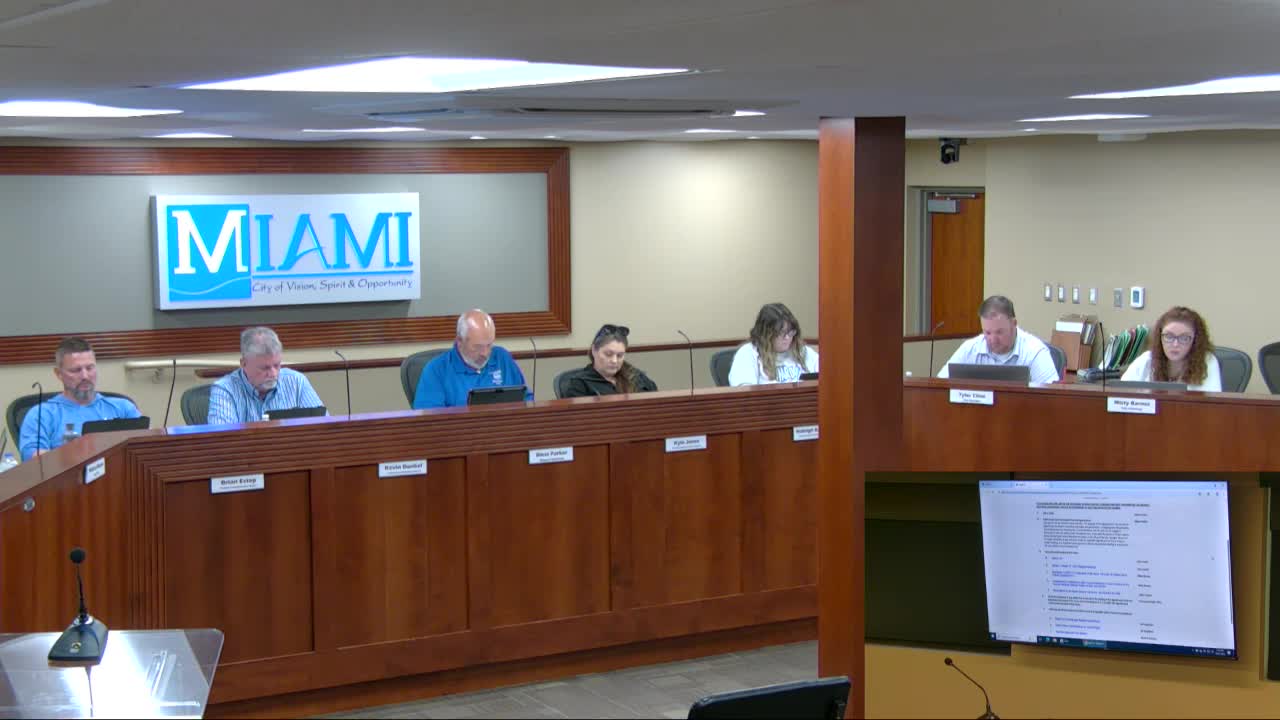Miami council approves slate for Senior Center 501(c)(3) board amid debate over financial controls
Get AI-powered insights, summaries, and transcripts
Subscribe
Summary
The Miami City Council voted to approve a list of nominees to the Miami Senior Center 501(c)(3) board, contingent on the nonprofit’s own approval, after an extended discussion about separating the nonprofit’s funds and operations from city accounting and the limited United Way funding the nonprofit brings in.
The Miami City Council on Oct. 21 approved a slate of nominees to serve on the Miami Senior Center’s 501(c)(3) board, with the vote recorded as contingent on the nonprofit’s own approval at its annual meeting.
The decision came after more than an hour of discussion focused on whether the senior center’s nonprofit board should operate independently from the city and how the center’s fundraising and grant receipts are managed. Council members and staff debated auditors’ concerns about the city’s current role in handling nonprofit funds and how small United Way payments factor into the arrangement.
Council members discussed the nonprofit’s bylaws, which currently require at least one city council member to serve as a director; the council said the 501(c)(3) board would have to vote at its annual meeting to change that provision. The council voted to approve the list of nominees contingent on the nonprofit’s approval; the roll call at the vote showed Councilmember Parker voting yes, Councilmember Jones abstaining, and Councilmember Barnes voting yes.
Why it matters: Council and staff said the city provides the majority of operating funds for the senior center, which staff and the auditor said complicates having the nonprofit both accept outside funds and be managed, in practice, by city employees. Several speakers urged a gradual plan to separate the nonprofit’s finances so the 501(c)(3) could manage its own accounts and obtain grants restricted to nonprofit recipients.
Key details from the meeting included the size and source of outside funding: United Way payments to the senior center were discussed as $4,250 per distribution, paid twice per year (cited in the meeting as a potential $8,500 annual maximum), and the transcript also referenced $10,850 budgeted for the senior-center 501(c)(3) in the city budget. City staff said the majority of operating funds for the center remain city-supplied, and that moving to a fully independent nonprofit accounting structure would take time and outside accounting resources.
Council members and staff clarified steps for separation: the 501(c)(3) must vote at its annual meeting to change its bylaws if it wants to remove the requirement for a council member director; if the nonprofit elects not to amend the bylaws, the council said it would need to supply a council designee to meet the existing bylaw requirement. Staff also said that existing grant applications that depend on the 501(c)(3) status cannot be acted on by the city until the nonprofit completes its own governance actions.
During the discussion staff and council emphasized that city finance personnel currently maintain distinct accounting lines for funds received for the senior center and that those finance staff provide transparency; the council nonetheless cited auditors’ concerns and described the current arrangement as “not best practice.” The council directed staff to develop a timeline and plan to phase the nonprofit’s finances toward separation and to follow up on bylaw changes at upcoming meetings.
Votes and next steps: The council approved the nominees on a contingent basis and asked staff to return with a plan and timeline to separate the nonprofit’s accounting and to report back on possible ordinance or administrative changes needed to reduce auditors’ concerns. The nonprofit must vote at its annual meeting to accept the slate and any bylaw changes before the nominations are final.
The council did not adopt a policy that would immediately change day-to-day operations at the senior center; staff said rental income and existing city funding will continue to support operations while a transition plan is developed.
